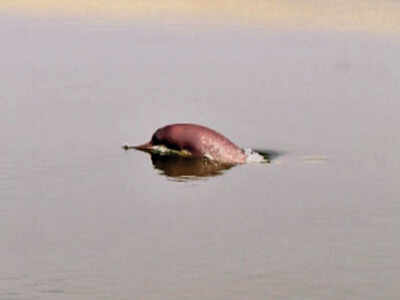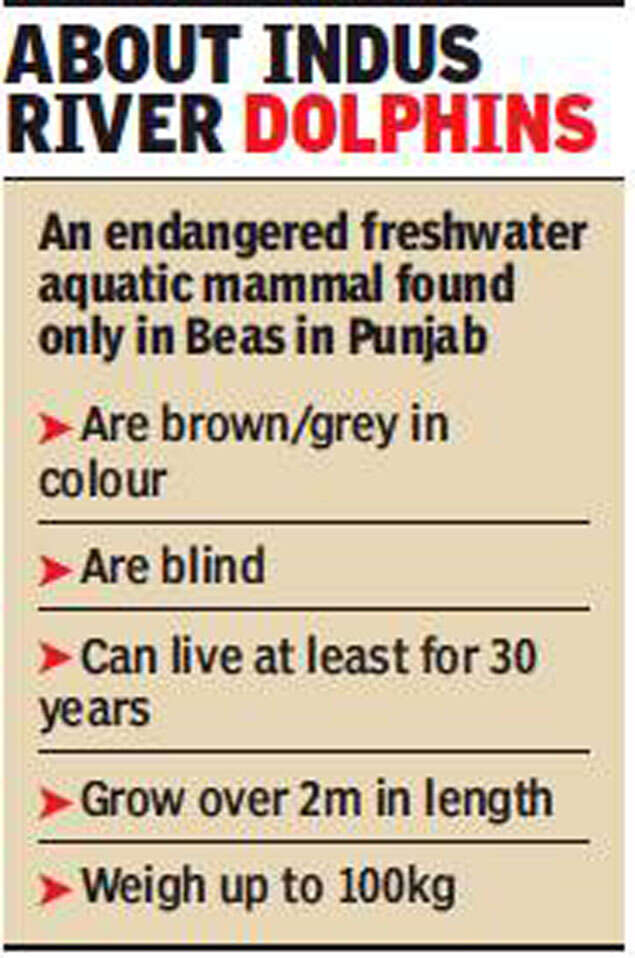
CHANDIGARH: The Project Dolphin announced by Prime Minister Narendra Modi during his address to the nation on 74th Independence Day has provided the much needed booster shot to the Punjab government for the conservation of Indus River Dolphin — one of the world’s rarest mammals.
Of four species of freshwater dolphin in the world, two are found in India — the Ganges and Indus river dolphins. Beas conservation reserve in Punjab is home to the only population of Indus dolphins in the country.

As per the official estimates, around 2,000 Indus river dolphins exist in India and Pakistan. The Indus river dolphin was first spotted in Harike wildlife sanctuary and Beas conservation reserve in 2007, and as per WWF India’s field surveys, the estimated population of dolphins is between 8 to 12 in the Beas. Indus dolphin is sharing common habitat with the reintroduced population of critically endangered Gharial since 2017.
The dolphin habitat has long been facing an onslaught of human-induced environmental disturbances, both domestic and industrial; low dry season flows; illegal fishing; and river bed mining. In May 2018, around 75,000 kilolitres of molasses had spilled into the Beas which had a severe impact on more than 120km of the river stretch.
The Project Dolphin will help the state government in taking corrective steps for protecting their habitat. The project will focus on conservation of dolphins and the aquatic habitat by using modern technology, especially in enumeration and anti-poaching activities. Besides, fishermen and other river dependent populations will be engaged for improving their livelihood.
Terming it as a significant development, Punjab’s chief conservator of forests Basant Rajkumar said the project would help in getting funds, expertise and international cooperation, which was a must for conserving the rarest freshwater mammal. “It’s very important to ensure that the dolphins and its habitat is protected. They can be an aquatic flagship species of the state, if we manage to increase their population,” said Rajkumar, who had spotted dolphins in the Beas in 2007.
WWF-India coordinator Gitanjali Kanwar said: “It’s heartening to hear about the project. Beas conservation reserve has a small, isolated, yet breeding population of Indus River Dolphin. We are hopeful that the project is going to bring the conservation of the state aquatic animal of Punjab into focus and ensure its long term survival.”
According to experts, river dolphins act as umbrella species for rivers, like tigers do for forests. If freshwater dolphins are thriving in a river then the overall health of that ecosystem improves.
Of four species of freshwater dolphin in the world, two are found in India — the Ganges and Indus river dolphins. Beas conservation reserve in Punjab is home to the only population of Indus dolphins in the country.

As per the official estimates, around 2,000 Indus river dolphins exist in India and Pakistan. The Indus river dolphin was first spotted in Harike wildlife sanctuary and Beas conservation reserve in 2007, and as per WWF India’s field surveys, the estimated population of dolphins is between 8 to 12 in the Beas. Indus dolphin is sharing common habitat with the reintroduced population of critically endangered Gharial since 2017.
The dolphin habitat has long been facing an onslaught of human-induced environmental disturbances, both domestic and industrial; low dry season flows; illegal fishing; and river bed mining. In May 2018, around 75,000 kilolitres of molasses had spilled into the Beas which had a severe impact on more than 120km of the river stretch.
The Project Dolphin will help the state government in taking corrective steps for protecting their habitat. The project will focus on conservation of dolphins and the aquatic habitat by using modern technology, especially in enumeration and anti-poaching activities. Besides, fishermen and other river dependent populations will be engaged for improving their livelihood.
Terming it as a significant development, Punjab’s chief conservator of forests Basant Rajkumar said the project would help in getting funds, expertise and international cooperation, which was a must for conserving the rarest freshwater mammal. “It’s very important to ensure that the dolphins and its habitat is protected. They can be an aquatic flagship species of the state, if we manage to increase their population,” said Rajkumar, who had spotted dolphins in the Beas in 2007.
WWF-India coordinator Gitanjali Kanwar said: “It’s heartening to hear about the project. Beas conservation reserve has a small, isolated, yet breeding population of Indus River Dolphin. We are hopeful that the project is going to bring the conservation of the state aquatic animal of Punjab into focus and ensure its long term survival.”
According to experts, river dolphins act as umbrella species for rivers, like tigers do for forests. If freshwater dolphins are thriving in a river then the overall health of that ecosystem improves.

Coronavirus outbreak
Trending Topics
LATEST VIDEOS
City
 145 inmates test positive in a day, Thiruvananthapuram central prison remains Covid-19 hotbed
145 inmates test positive in a day, Thiruvananthapuram central prison remains Covid-19 hotbed  Hundreds of birds injured due to banned manjha on Independence Day in Delhi
Hundreds of birds injured due to banned manjha on Independence Day in Delhi  Karnataka: Terrifying abduction of a woman in broad daylight caught on cam
Karnataka: Terrifying abduction of a woman in broad daylight caught on cam  Independence Day 2020: Beating retreat ceremony at Attari-Wagah Border as a part of celebrations
Independence Day 2020: Beating retreat ceremony at Attari-Wagah Border as a part of celebrations
More from TOI
Navbharat Times
Featured Today in Travel
Quick Links
Kerala Coronavirus Helpline NumberHaryana Coronavirus Helpline NumberUP Coronavirus Helpline NumberBareilly NewsBhopal NewsCoronavirus in DelhiCoronavirus in HyderabadCoronavirus in IndiaCoronavirus symptomsCoronavirusRajasthan Coronavirus Helpline NumberAditya ThackerayShiv SenaFire in MumbaiAP Coronavirus Helpline NumberArvind KejriwalJammu Kashmir Coronavirus Helpline NumberSrinagar encounter
Get the app





